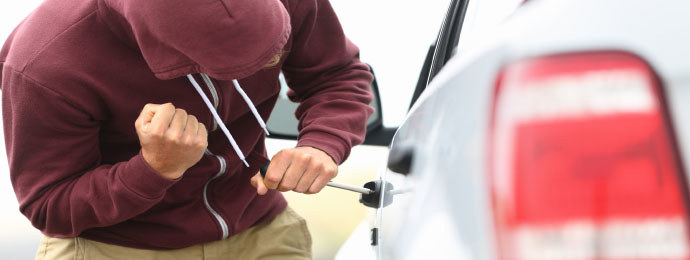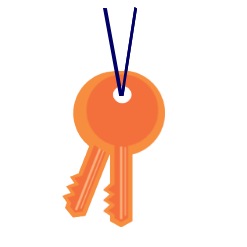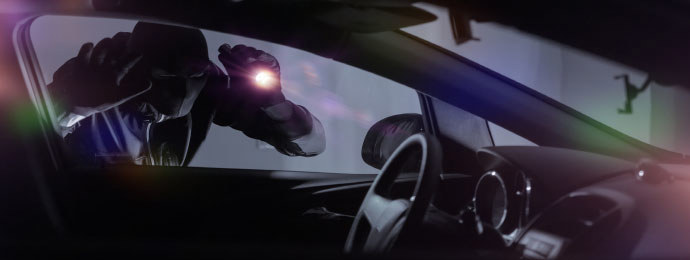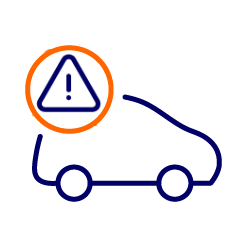Tips on Keeping Your Vehicle Secure
Our cars are a huge part of modern-day life, so vehicle security is an essential issue for all motorists. According to Statista, over 100,000 motor vehicles are stolen in England and Wales each year. With car theft numbers on the rise and thieves using more hi-tech methods to commit their crimes, it's more crucial than ever to protect your vehicle. Improving your vehicle security will help prevent thieves and help reduce insurance costs in some cases.

To help keep your vehicle as safe and protected as possible, car leasing specialist Nationwide Vehicle Contracts has put together a comprehensive guide with our top tips to ensure your vehicle and its contents remain as secure as possible.
In this guide, we look at some car security top tips, including:
“According to Home Office figures, vehicle thefts in England and Wales cost insurers almost £1.5 billion per year. No matter where you live in the UK, it is important to be vigilant. Taking simple steps, like locking your car, parking in a well-lit area, and ensuring valuables are kept out of sight can help deter criminals.”

Despite constant improvements in vehicle engineering, car theft and vehicle break-ins are still common. According to Halfords, 22% of car owners in the UK have had a car lease hire stolen at some point. While it's impossible to eradicate vehicle theft, you can make it as hard as possible for thieves to break in. By taking some extra simple precautions, you can reduce the likelihood of incidents happening to your vehicle.
Don't leave any belongings or valuables inside your vehicle
This tip might seem obvious, but it is often neglected, so be sure to take your belongings with you to help prevent thieves or vehicle vandalism. This includes your wallet, sat navs, tablets and mobile phones. Even having a coat or bag on display or leaving loose change on the dashboard is enough to entice somebody to break into your vehicle.
Common items thieves target include:
- Portable sat navs or SD cars
- Smartphones
- Wallets and cash
- Aftermarket DVD entertainment systems
- Dashcams
The best way of preventing theft of these accessories is to not leave them in the car at all. Better still, don’t leave any evidence of them – no charging cables, mounting brackets or even the residue that such brackets leave. It may even be a good idea to leave your glove box open, so it’s obvious there’s nothing of worth inside.
It's also vital that you don't keep any important documents inside your vehicle. This includes insurance forms and your vehicle logbook. If these records are inside your vehicle and it gets stolen, the thieves could use them for fraudulent purposes to potentially sell or scrap your car for cash.
When leaving the vehicle unattended, make sure you look around the interior of your car before you get out to check that you haven't left anything valuable on display. If you have to leave something in your vehicle, try hiding it in the boot.
Keep your keys safe
One of the major advancements in basic car security has been the closing down of simple ways of bypassing the keys. Thieves can no longer expect to hop in a car, easily hotwire and drive away before someone realises what they are doing. Instead, car crime is increasingly a two-part theft: car keys are stolen and subsequently used to steal cars.
Theft of car keys typically occurs via:

Burglary of your home
If the worst was to happen and your home gets burgled, you'd think the first items to get stolen would be the television or any jewellery however, keys are also a hot item thieves look for. In some cases, thieves commonly use the car keys stolen from the home to steal and use as a getaway which they sometimes dump the vehicle or look to sell the car itself on or even sell for parts.

Keys left by an unlocked front door
Leaving your front door unlocked with any amount of valuables behind it is a bad idea, especially if your car keys are on show. Thieves won't hesitate to test door handles and knobs to see if someone was clumsy enough to leave the door unlocked. If you forget to lock your front door, your keys are easy pickings for any intruder to have asses too.

Keys 'fished' through a letterbox:
It's common for thieves to try and hook or grab your keys through your letterbox using long sticks or even their hands if your keys are located so close to the door. It's essential to leave your keys out of sight and out of reach from any doors or windows, so no thief is tempted to try and steal them.

Pickpocketing, especially from unattended clothing or bags
Pickpockets are prone to stealing keys, wallets and phones from you when you least expect it, so it's essential to make sure your valuables are secure and well-hidden when carrying them around. Even having a key chain dangling out your bag or coat, a keen-eyed thief can see that as an opportunity to try and steal it from you without you noticing.

Mugging
As unfortunate as they are, muggings are hard to prevent. However, you can make yourself less of a target by not showing any values with you when you are out and about. Having your car keys or wallet in your hand while walking can make you more appealing and an easier target to a passing criminal. The best thing to do is keep your keys and belongings hidden in your pocket or hidden away in your bag.

Carjacking
This type of robbery is when your vehicle is taken directly from the owner or driver of the car. Carjackings can involve violence or the threat of violence to steal the vehicle. If you are involved in a carjacking, the best thing to do is stay calm, get out of the car and call the police. You don't want to fight back in a carjacking situation as you can make the situation worse and put yourself in danger. The best way to prevent a carjacking from happening is always to keep your doors locked while driving.

Keys left in locks
You should always try and remember your keys and not leave them in locks, whether it's leaving your keys in the front door or in-office cabinet. When leaving keys in locks, you are essentially leaving them out for anyone to pick up and have access to whatever they chose, in most cases, your vehicle. Plus, most modern car keys are very expensive to replace, so it best to keep them in the best condition and make sure you don't lose them.
The best way to stop your keys from being stolen is to keep them out of sight. At home, the most commonplace for leaving keys are under a doormat or near the front door. These spots are perfect for convenience but are now recognised spots for keys and it is the first place thieves look. It's best to put your keys out of view and out of reach.
Once you find a place to keep your keys safe, it's also a good idea to invest in some signal-blocking pouches. Thieves nowadays use jammers to obtain the fob and the car's signal, leaving the vehicle unlocked and vulnerable to theft. Placing your keys in a signal-blocking pouch will reduce the chance of any thieves amplifying your key's signal. Nevertheless, thieves can leave the signal jammers at the side of a car park or even in bushes, so it's always best to be on your guard and double-check that your vehicle is locked.
Preventing car identity theft
If you ever find that your number plates have been stolen, you must immediately report it to the police to avoid any legal tangle that can easily ensue. Whoever stole the plates is likely to be using them on another vehicle. This may have been done for the reasons below:
- To be fitted onto a stolen car or a vehicle that has been declared unsafe for road use.
- To disguise a vehicle used in a crime, for example, a speeding fine or a ram-raid.
- To avoid congestion charges.
To avoid your number plates being stolen, follow the advance and tips above to keep your vehicle as secure and safe as possible. If you find yourself a victim of number plate theft, you must report the issue to the non-emergency police number on 101. You also want to get your number plates replaced as soon as possible so that your car is road legal again.
Preventing component theft
Your vehicle has many valuable components, and parking it outside where thieves can access them makes it a target. Most break-ins target expensive belongings like purses and electronics. However, as the cost of car parts continues to rise, thieves are now targeting your vehicle components. The most common components stolen form are a vehicle tend to be:
- Battery
- Catalytic converter
- Tailgate
- Valve stem caps
- Wheels
Unfortunately, there are no special measures you can take to prevent these components from being stolen. The best way to avoid any theft relating to your vehicle is to park somewhere safe and secure with CCTV. Also, it's a good idea to invest in a dashcam even though it won't stop any components from your vehicle from being stolen. It definitely would help when trying to recover them.

Keep the vehicle locked at all times
All the latest security technology systems in the world can't prevent vehicle theft if you leave it unlocked. This advice might seem obvious, but ensure that you secure and lock your vehicle even if you're just going into the shops. That includes all doors, windows and even the boot. Most new vehicles nowadays tend to lock themselves after a while. Nevertheless, you should always double-check to make sure your vehicle is locked.
Unfortunately, there's no sure way to prevent anyone from breaking into or stealing your vehicle. While getting the right accessories and devices can help reduce the likelihood of becoming a victim of car theft or vandalism, cars are desirable targets, and anyone with the right tools, knowledge and available time may target yours. Investing in further counter-measures, like the below, is therefore essential.
Security features to consider include:

Car alarms
Most modern cars come with an alarm as standard however, if you drive an older vehicle, getting an alarm professionally fitted will make your vehicle more secure. While a car alarm can't physically stop a vehicle or the valuables inside from being stolen, a thief will likely think twice. The piercing sound and flashing lights are a powerful deterrent and will attract too much attention. Some modern alarms come with a pager or mobile app to alert you if they are activated, constantly updating you on the whereabouts and surroundings of your vehicle.

Immobilisers
An immobiliser is an electronic device that prevents a vehicle from starting unless the correct key or key fob is used. Although an immobiliser won't prevent a car from being broken into, it can stop it from being stolen. All modern UK vehicles have immobilisers equipped as standard, but if you drive an older vehicle, getting an immobiliser professionally installed will help secure your car.

GPS trackers
Electronic GPS trackers are devices used to check something or someone's location remotely. Getting one fitted means if stolen, the vehicle can then be tracked and recovered from an exact location. However, tracking systems can be relatively expensive and can require a significant monthly subscription charge.

Steering wheel lock
These tricky metal locking devices prevent the steering wheel, handbrake or gear stick from being used when stationary. They are usually brightly coloured and indicate to any potential thieves that this car will take longer to steal and move onto another more accessible vehicle. While an effective deterrent, they are relatively cheap to buy, but in general, the more you pay, the better the security. When purchasing a steering wheel, handbrake or gear stick lock, you should ensure it's the right fit for your car before you buy them.

Dashcam
Getting a dashcam fitted with the Intelligent Parking Mode feature means the dashcam will switch itself on and start recording any bump or physical movement on the vehicle while your car is parked. With a parking camera for your vehicle, you will know precisely when and where your car has been bumped. This feature adds even more protection to give you greater peace of mind when your vehicle is unattended. A dashcam is also helpful in finding out who was at fault in a car accident. Plus, if you ever break down, a dashcam can act as a GPS tracker, which can help the emergency services find you.
“While car crime can strike anywhere, inner cities are the worst areas for vehicle theft. If you work or live in a major city, use a Park Mark car park for extra safety, or one that is well-lit and has lots of foot traffic. If you're planning an overnight trip, consider leaving the car at home and using public transport. Research shows four out of five vehicle-related thefts happen during the hours of darkness.”

Choosing where to park can have a massive effect on the safety of your vehicle. Finding the right place to park your van can reduce your vehicle's chances of getting broken into, so don’t just park in the first space you see. Some parking areas are more susceptible to crime, so the location can also play an essential role in calculating car insurance premiums. You should always try and park in well-lit areas and where your vehicle is in view of a camera or pedestrians.
Parking at home
When you are parking at home, you should try to park your car as close to your home as possible. The best place to park your vehicle is either in your garage or on your driveway. However, if you can't do either, try and park in line with your window so you can keep an eye on it. Thieves are less likely to attempt to steal a vehicle that homeowners and passersby can easily see.
Car parks
When parking in a car park, try and find one with CCTV and pick your space wisely. The best spaces to park in are well-lit ones and have plenty of other cars in the vicinity. It may be more of a hassle to park; however, it's a lot harder for a thief to steal a vehicle surrounded by other vehicles than one that is parked on its own.
Parking on the road
When parking on the road or a side street, you should try and park in a public area or a place where CCTV can see your vehicle. When your v
Even with the best practice of all the tips and advice shown in this guide, you can never eliminate the possibility of your car getting stolen. If the worst happens and you find your vehicle has been stolen, you must tell both the police and your insurance company straight away. You'll get a crime reference number which you will need when you call your insurance provider. The police will inform the DVLA about the theft and if the vehicle is found. More information on what to do when your vehicle is stolen can be found on Gov.uk.
Thinking of car leasing for immediate delivery? Visit our motoring guides, view our latest vehicle leasing offers or call Nationwide Vehicle Contracts on 0345 811 9595 for expert advice.
Guide Information
Originally published: 9th June 2021
